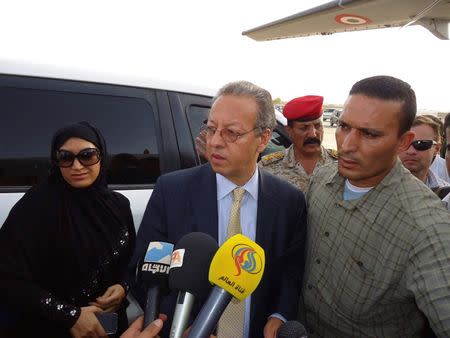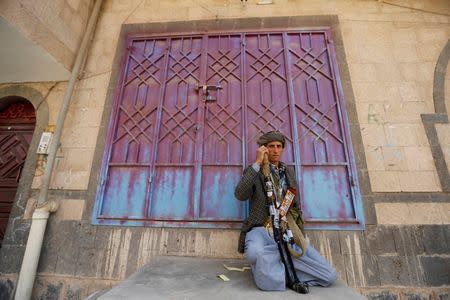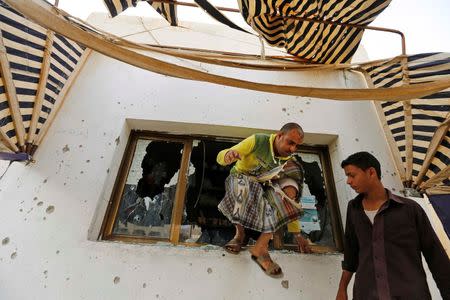Shi'ite rebels shell Yemen state TV, residents flee fighting
By Mohammed Ghobari SANAA (Reuters) - Armed Shi'ite rebels shelled Yemen's state-run television building on Friday as they advanced into Sanaa, sending hundreds fleeing their homes in a dramatic escalation of violence after weeks of fighting and protests, officials and residents said. The fighting was the worst in years in the capital of the poor Arabian peninsula country and appeared to be the biggest challenge yet to a U.N.-backed transition to democracy launched after veteran ruler Ali Abdullah Saleh stepped down in 2012. The conflict intensified on Thursday when Shi'ite Houthi rebels clashed with the army on the outskirts of Sanaa, and expanded into fighting mainly between the Houthis and tribesmen allied with the al-Ahmar clan, residents said. Prominent figures from the mainly Sunni Muslim clan, one of the most powerful tribes in Yemen, hold senior positions in the armed forces and the government. Government soldiers were taking up defensive positions around state institutions, residents said, while Houthis appeared to be in control of some northern streets as fighting continued along Thalatheen Street, a major route into the western edge of Sanaa. The fighting was creeping closer to the private residence of president Abd Rabbu Mansour Hadi on the northwestern end of Siteen Street, residents said. One of the capital's main avenues, Siteen starts at the airport in the north and runs all the way to the official Presidential Palace, to the south. Hadi described the recent assaults by the Houthis as "escalating measures and coup attempts to topple the state", according to state news agency Saba. Insecurity and political turmoil have mounted in Yemen since Arab spring protests ousted Saleh. The Houthi insurrection is one of several security challenges in Yemen, which borders oil exporter Saudi Arabia and is struggling with a secessionist movement in the south and the spread of an al Qaeda insurgency. The Houthis, who belong to the Zaydi sect of Shi'ite Islam, have been involved in a decade-long conflict with the Sunni-dominated government, fighting for more control and territory in the north. In recent weeks, Houthi protesters have blocked the main road to Sanaa's airport and held sit-ins at ministries calling for the ousting of the government and the restoration of subsidies cut by the state in July as part of economic reforms. "Today's fighting is the heaviest, they are using all kinds of weapons," one resident living on Thalatheen said. Like others who spoke to Reuters, he asked not to be named for his own security. One military source said around 70 Houthi fighters were killed in fighting overnight, and residents told Reuters dozens of bodies and body parts were scattered in the north and northwest of the capital where the clashes took place. Shi'ite Houthi gunmen had taken over some army and security checkpoints on Siteen Street and the northwest al-Shamlan district with almost no resistance from government soldiers, residents said. Houthis were patrolling the streets and no government forces were seen nearby, they said. POLICY OF RESTRAINT A senior government official told Reuters the army was following a "policy of restraint" to give U.N. special envoy to Yemen Jamal Benomar a chance to find a way out of the conflict. "They are protecting government installations, and have avoided getting into confrontations with the Houthi insurgents. But that will not last for long," said the senior official, who spoke on condition of anonymity. Benomar had a three-hour meeting with Houthi leader Abdulmalek al-Houthi in Saada province on Wednesday which he described as "constructive and positive", Saba reported. The Houthis said on Monday they would no longer take part in negotiations with the government about their grievances because of what they termed "foreign intervention" in the discussions. Rebels fired mortars at the state-owned television channel building in Sanaa on Thursday night and the channel said the shelling continued on Friday morning. An employee trapped inside the state TV building, which is located near other vital state institutions, said he was hiding in the basement along with dozens of others. "The shelling on the channel has increased in a terrible way. We are surrounded and the army forces outside are trying to protect the building and fire back," he said by telephone. Yemen TV went briefly off air before resuming its broadcast. Hundreds of residents were rushing to flee affected neighbourhoods and push towards the south. "The shells fell on the house next door so I took my wife and kids and went towards the south of the capital. We left everything behind," one resident said. Some petrol stations in Sanaa were packed with drivers jostling to fuel their cars with petrol. Saba news agency cited a security source as denying that the Houthis controlled some residential areas in north of the capital, but he admitted that rebels had attacked security and army checkpoints in the Siteen and al-Shamlan areas. (Reporting by Mohammed Ghobari; Writing by Rania El Gamal; Editing by Sonya Hepinstall and Dominic Evans)

 Yahoo News
Yahoo News 





